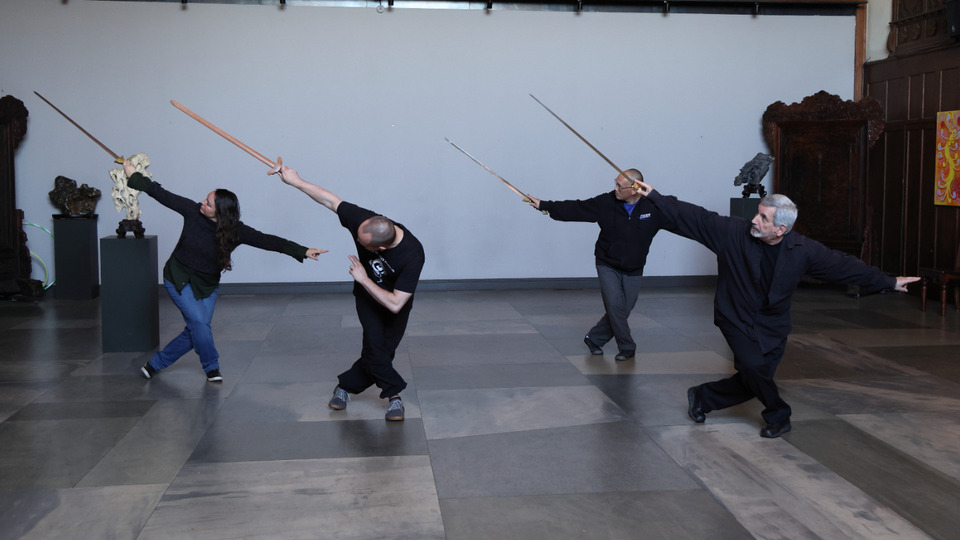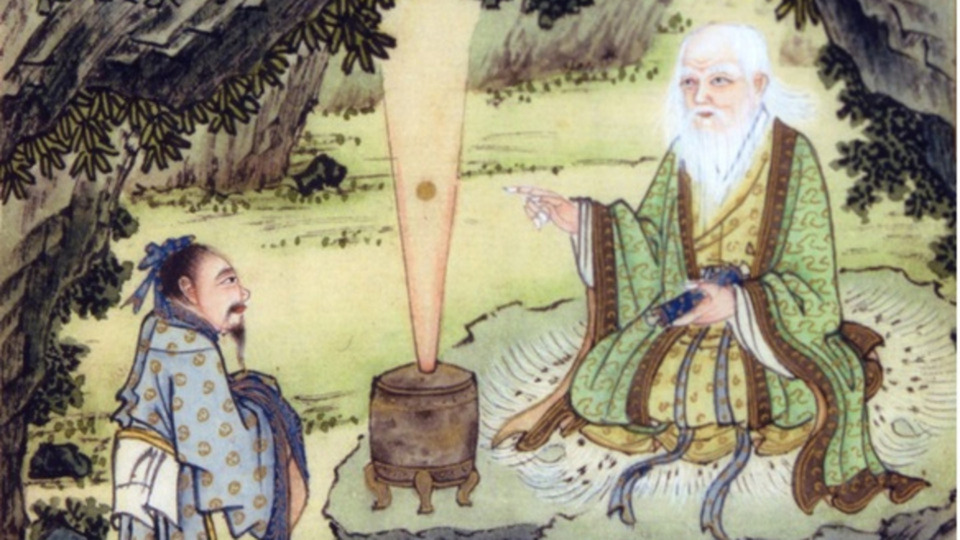
Hun Yuan Gong 混元功 is one of the most important Qigong methods in the Hun Yuan system, recommended as foundational for beginners through advanced practitioners. Hun Yuan Gong promotes health, prolongs life, deepens stillness, improves mental clarity, and increases internal strength.
Movements are performed standing, and involve various gathering motions, as we draw in qi 氣 from the environment to augment our Prenatal Qi 先天元氣 (our genetic inheritance), as well as opening and closing motions. This practice opens the qi-channels of the body and establishes the Danqiao 丹竅 and the Dantian 丹田, energetic openings in the body where the essence, qi, and spirit 精氣神 are cultivated.
Suitable for beginners.
Prerequisite: None

Chansi Gong develops silk reeling energy, a kind of spiral movement connecting through the entire body, unique to the Chen-style Taiji system. This set also includes joint opening exercises. When the dantian is full of qi and the joints are open, the spiraling movements of silk-reeling convey qi throughout the channels to connect all of the eighteen pivots of the body together as one. This generates tremendous power and fluidity of movement, a the hallmark of Chen style.
An excellent class for beginners through advanced practitioners, Chansi Gong is the second most foundational qi gong set in the Hunyuan Taiji system (after Hunyuan Gong).
Suitable for beginners.
Prerequisite: None.

Fang Song Gong, literally “releasing into suppleness” gong builds on a foundation of Hunyuan Gong to increase “sōng” 鬆, the body’s soft, supple, connected throughness. Fang Song Gong was originally a secret method, and is regarded as the most advanced of the three primary gong sets in the Hunyuan Taiji system.
While a more advanced qigong practice, beginners can still gain benefits.

Stick and Ruler Gong is actually two sets of qigong exercises practiced with different devices. The stick is used to train the twisting movements employed in qinna (joint-locking) using internal skill – another hallmark of Chen-style Taiji. The ruler is used to intensify qi harvesting and circulation and to deepen stillness practice. These exercises are auxiliary and not considered as essential for frequent practice as the others, although they yield great results.
This system of qigong is attributed to Chen Xiyi, a Taoist who lived on Hua Mountain in the Song Dynasty. This version was transmitted from Hu Yaozhen through Feng Zhiqiang.
(Stick & ruler sets are available to borrow during class or for purchase from the Bookstore.)
Prior practice in qi gong and/or tai chi form is recommended.

Beginning Tai Chi (the Simplified 24 Form) trains the fundamental energies of tai chi as well as postural principles, while introducing key movement patterns used in future forms. While this tai chi form is "simplified" (ie. includes fewer circles, spirals, and more difficult-to-coordinate movements), it is far from simple. Advanced principles of Tai Chi underly this form, and advanced practitioners continue to gain benefit from its practice.
A bridge between qi gong and the tai chi forms, the HunYuan Taiji Simplified 24 Form is the foundation for both martial and internal cultivation in the practice of the HunYuan system, and is the appropriate place to start learning Tai Chi Chuan (Taiji Quan) at the Taoist Studies Institute. Qi Gong practice (such as Hunyuan Gong and Chansi Gong) are excellent complements to tai chi class.
Benefits of Tai Chi practice include: improved balance, flexibility, cardiovascular health, sleep, mental clarity, posture, pain reduction, and more.
Suitable for beginners.
Prerequisite: None

Building on the foundations learned in the beginning Tai Chi form (the Taiji Simplified 24 Form), the Hunyuan Taiji Regular 24 Form involves more circular movements and spirals (chansi or silk-reeling) energy.
Tai Chi builds upon the foundation of Qigong practice, bringing the skills of Qigong into practical application. Taiji is also called chang quan or continuous boxing. This quality of continuous circulation of qi throughout the body for up to 40 minutes during Tai Chi form practice confers benefits different from Qigong sets, which involve more stillness.
Prerequisite: Beginning Tai Chi (Taiji Simplified 24 Form)

The hallmarks of Chen Style Tai Chi Chuan (Taiji Quan) are variation in speed, alternating soft and explosive movements, and a kind of spiraling movement known as Chansi jin (silk reeling energy). Emphasizing lower stances and a more energetic performance, Chen Style has forms suited for both beginning and advanced practitioners.
For advanced students, the Hunyuan Taiji 48 Form is twice as long as the 24 Form, with the moving-step Tai Chi Regular 24 Form comprising roughly the first half of the 48 Form, with important variations. The 48 Form both requires and develops greater coordination throughout the body, including kicks and spins that are not present in the intermediate Tai Chi Form (the Taiji 24 Form).
Prerequisite: Intermediate Tai Chi (Hunyuan Taiji Regular 24 Form)

The eight gates (Peng, Lü, Ji, An, Cai, Lie, Zhou, Kao) and the five steps are the basic components of Taiji Quan.
Every movement should be an expression and transformation of these energies.
Without them Taiji Quan is merely empty form.
In this class we will explore these fundamental energies, how they are expressed in Chan Si Gong, Taiji Quan forms, and their practical application.
The Nei Dan Shi San Shi is an elegant form that combines practice of thirteen energies with internal cultivation.

Bagua Zhang 八卦掌 is an internal system of martial arts similar to Taiji quan. The hallmarks of Bagua are its circular stepping and its marvelous development and utilization of special awareness both within and outside of the body. This gives the practitioner the ability to move and change direction with ease, to evade and neutralize the opponent, and to generate internal power.
Bagua Zhang, like Taiji quan, is comprised of a comprehensive system of internal martial arts and meditative practices. Bagua zhang is philosophically related to the Yijing, or “Book of Changes”. In its basic practice, special stepping techniques are used to walk a circle, while various coiling methods are used to change direction around the circle. Bagua zhang is as challenging to learn as it is beautiful.
While this class is open to beginners, it is a challenging place in the TSI curriculum to begin. Prior qigong and/or the tai chi form practice is recommended.

Jian 劍 (Double-Edged Sword)
Prerequisite: Hunyuan Taiji 48 Form or instructor permission.

Push hands is an important component of the taiji quan system. The practice of push hands helps to rectify the empty hand forms, increase internal strength, develop awareness of self, and cultivate ability to listen to, interpret, and transform the force of an opponent. It is through push hands training that one can truly develop the taiji energies.
Prerequisite: Hunyuan Taiji Regular 24 Form

Taoist (Daoist) Meditation combines spiritual cultivation with the nourishment of physical health and vitality 性命雙修. The juxtaposition of these two aspects results in a potent system of practice.
Taoist (Daoist) Meditation
The foundation of Taoist (Daoist) practice is the cultivation of stillness. Both movement practice and still practice rely on the cultivation of stillness. It is the stillness that allows the practice to be effective and safe. Movement within stillness and stillness within movement 靜中動動中靜. Winter is the ideal time to develop and deepen stillness in practice.
Rong Qi Teng Mo Dao Yin Self Massage
融 氣 騰 膜 導 引 按 摩 法
A comprehensive system, Rong Qi Teng Mo Dao Yin Self Massage combines Taoist daoyin and self massage methods which systematically nourish, open channels increase vitality to: strengthen, restore and transform the body and clarify the mind.
Study & Recitation of Taoist (Daoist) Sacred Texts
Taoist texts 道教經典 are the warp, the underlying threads, that carry Taoist tradition through time.
Deep Nourishing
Deep nourishing practices enhance rest and rejuvenation. Taking the time to nourish oneself in the winter lays the foundation of health and vitality for the coming year.
Taoist Napping and Sleeping Practices
These practices, which are especially effective in the winter, will also be taught.
~~~
Appropriate for beginners through advanced practitioners.
Stay for 3, 5, 7, or the full 10 days as fits your schedule.
~~~
General Retreat Information:
(Visit our general retreat page for images and additional information)
Retreats offer a chance to dive deep into Taoist practice. Let the cares of the rest of your life fall away and allow yourself to be nourished through movement, stillness, good food, and the beauty of nature. Immersive practice time combined with individualized instruction offers a chance to accelerate your progress, no matter your level of skill.
Retreats includes full daily instruction by Master Mo ZhiCheng. Classes typically run from 9 a.m. - noon and 2 p.m. - 5 p.m. After dinner, attend lecture and open question time from ~7 - 8:15 p.m.
Retreat cost includes full room and board. Sleeping facilities are in semi-private rooms, which include bunk beds and are segregated by gender.
If you have questions or special needs, please ask!
Tiered Pricing:
Cost includes full daily instruction by Master ZhiCheng + full room and board.

When registering, enter the payment amount corresponding to the number of days and your preferred tier. Then send an email to info@taoiststudiesinstitute.org with the dates you plan on attending to reserve your room.
Retreat Cancelation Policy:
For cancellations...
- More than 30 days in advance: 90% refund as class credit.
- Between 30 days and 1 week: 50% refund as class credit.
- Less than 1 week before the retreat: no refund.

Join us for a day (or just an hour) of meaningful work, good company, and shared purpose at the Xuan Xiu Gong Taoist Sanctuary.
Projects include:
• Trail maintenance (clearing fallen branches, trimming salmonberry, spreading woodchips)
• Painting the hall
• Chipping downed branches
• Planting trees and prepping the vegetable garden
Come for an hour or stay for the day—every bit of help makes a difference!

The Thirteen Energies — the Eight Gates and Five Steps (八門五步) — are not only the essential foundation of Tai Ji Quan (Tai Chi Chuan) but also correspond to and embody cosmic principles. All movements in Tai Ji Quan are variations and combinations of these Thirteen Energies.
In this series, we will explore the underlying principles and methods of practice while examining their relationships and resonances with the Eight Trigrams of the Yi Jing and the cosmological dynamics of the Thirteen Energies. Instruction will include both individual movements and the complete Thirteen Energies Set, providing a comprehensive foundation training in these fundamental methods.
7 week series, November 3 - December 15
Mondays 9 – 10:30am (90 minutes) Pacific Time (US)
Online Only
Taught by: Shifu ZhiCheng
Suitable for beginners.
Prerequisite: None.
Recommended Corequisite: Online weekly 13 Energies Tai Chi Form practice, Mondays 7pm Pacific Time.
Cost: $259 for 7-week series.


